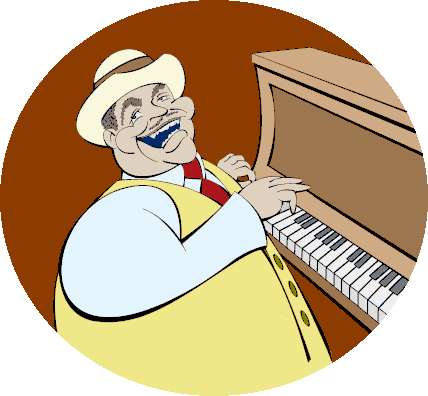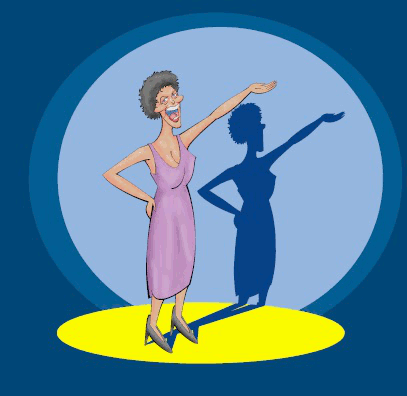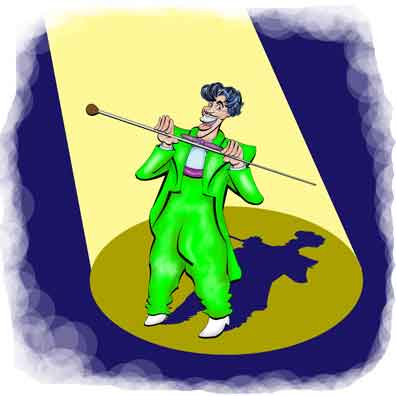Fats Waller

Although many famous musicians have never been the subject of a proper academic biography, that's certainly not the case for Thomas Wright Waller. There's more books about "Fats" than a lot of other musicians.
It may seem strange that the King of Stride Piano started off as a church organist. But Fats was born in 1904 in Harlem to a religious family. His dad was even a minister, and so it was natural that the musically gifted kid would provide the music for the congregation. As a teenager he also found work in the theaters where the soundtracks for the soon to be passé silent movies had to be live music.
Although Fats never graduated from high school, his education was not that bad when the eighth grade was all that was considered necessary and high school was more of an affectation for the rich kids. But any lack of formal education was no handicap and what marked Fats's career was how quickly he achieved both critical and commercial success.
Some sources say Fats began working professionally at age 15. Fats himself, though, said it was "approximately" 14. But establishing himself had some obstacles since his dad literally dragged him out of the Lincoln Theater when he found his son playing the organ in a such a "den of iniquity".
Yes, Fats played organ in the theaters. And although it brought his dad's disapprobation, Fats knew that playing music was a better job than he could get anywhere else. There was no formal audition either. He landed the job by just coming into the theater and sitting down at the organ and starting to play. The owner had no objections particularly after Fats began to attract more customers than the films did. Eventually he put Fats on the payroll at the munificent salary of $23 a week. One of those who heard Fats in these early years was John Hammond who would become one of the most important record producers in America. Professional musicians were also impressed when they heard the kid, not just in the theaters but in his church.
In a few years Fats was cutting records - on the organ. Admittedly jazz organists are few and far between but he left us a number of sides in this most unusual genre. One discography of Fats's lists over 40 discs with him just on the organ. He even made recordings at London's famous Abbey Road studio1. Fats would also sing, his voice high and clear with perfect diction. His "Swing Low, Sweet Chariot" has to be heard to be believed.
Of course the demand for jazz organists couldn't compete with the need for piano players. Part of the supply-demand curve of piano over the organ was simply there were more pianos and they're easier to maintain. Piano players were also needed in nightclubs and, well, in certain establishments that were devoted to gentleman's special interests. But one of Fats's most regular means of employment was the now-defunct institution called the rent party.
The rent party is exactly like it sounds. A bunch of people would come over to a house or apartment where for a small fee - usually 25¢ - they could have good food, good drinks, listen to music, dance, and more or less have a good time with the proceeds going to pay the tenants' rent. Of course the musicians got in free and if the free food and drinks weren't considered adequate, the musicians could either pass the hat or get a percentage of the take. Rent parties were so common that there were even movies made about them. With his high calibre playing Fats was soon being compared to the original King of Stride Piano, James Johnson.
"Stride piano" has been described as "ragtime on steroids". The left hand plays a steady driving bass while the right hand executes a veritable gymnastics of musical lines. Knowledgeable musicians say stride strikes fear into the hearts of even the most able of pianists.
The importance of stride piano is that it was the genre that bridged the ragtime era and jazz. Although the world "ragtime" is used most prolifically after World War I, the word as a musical genre extends back as early as 1897 and was clearly linked with the music of the African American community2. "Jazz" shows up in print in 1916 and is clearly intended to refer to music that is less than respectable. The word was also used to refer to a popular activity possibly because establishments that provided that activity often had jazz bands to entertain the waiting customers. But by the time Fats began recording in the 1920's, stride pianists were considered full-fledged jazzists and jazz was a music that wasn't going away. The music's respectability was cemented quickly when George Gershwin wrote "Rhapsody in Blue" in 1924.
Footnote
Although the earliest articles are important from a historical standpoint, their condesending tone (to put it mildy) makes for painful reading.
Of course Fats was in motion pictures. His most famous appearance was in Stormy Weather starring Lena Horne, Bill Robinson, and Cab Calloway. Although he didn't get top billing, Fats is clearly the star of his scenes. And yes, he played "Ain't Misbehaving". Unfortunately, Fats only lived five months after the film's release.

Lena ...

... and Cab
They were with Fats.
We must admit Fats's lifestyle was not the healthiest. Reportedly tipping the scales at 285 he also smoked heavily, which a lot of other people did in the 1930's. So it's easy to assume that when he died at age 39 it was from a heart attack.
However, it was actually pneumonia. While playing on the West Coast in December, 1943, Fats developed a bronchial infection. After the booking was over, he and his manager, Ed Kirkeby, were returning to New York on the Kansas City Super Chief. Although Fats seemed to be managing OK, he was very tired and slept during most of December 14.
The next morning the train pulled into Kansas City's Union Station. Despite Fats keeping the stiff upper lip, Ed knew he was severely ill and he could hear him shivering and his labored breathing. Ed found a doctor and told him Fats needed immediate attention. The doctor looked in the berth and informed Ed that Fats was dead.
References
Fats Waller His Life & Times: Alyn Shipton, Alyn Shipton, Universe Books, N. Y., 1988.
Fats Waller : His Life and Times, Joel Vance, Contemporary Books, 1977.
"How To Master the Seemingly Impossible Old Style of Stride Piano", Keyboard Magazine, January 1, 2020.
"Ragtime", Edgar Werner, Werner's Magazine - Volume 29 - 30, Part 1, p. 590, 1902.
"Before the Curtain", The San Francisco Call, November 21, 1897, p. 29, Chonicling America, Library of Congress.
"Saloonkeepers Plan to Organize For Fight on Prohibition Crusade", The Day Book, December 23, 1916, Chonicling America, Library of Congress.
"Fats Waller at the Pipe Organ", Thomas Cunniffe, Jazz History Online.
"Fats Waller", Discography of American Historical Recordings, University of California at Santa Barbara.
"Fats Waller - Discography", Discogs.